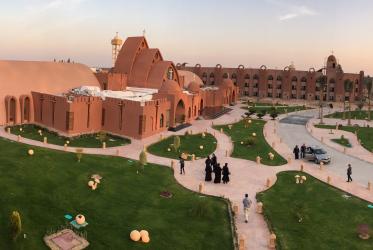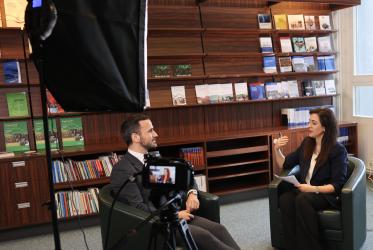Teachers and Witnesses of the Church: space for ecumenical convergence
By the Very Rev. Dr Cyril Hovorun
I am addressing you on behalf and by request of Archbishop Hilarion (Alfeyev), who is one of the co-moderators of the study on Tradition and traditions: Sources of Authority for the Church which was launched after the Faith and Order Plenary Meeting in Kuala Lumpur (2004). Because Archbishop Hilarion is extremely busy with his new service as a head of the Department for external Church relations of the Moscow Patriarchate, he asked me to represent him at this plenary regarding the above-mentioned study and its first consultation on The Teachers and Witnesses of the Early Church: a common source of authority, variously received? to which he still pays much attention. As a patristic scholar and participant in many ecumenical meetings, I think it is crucially important for the wider acceptance of the dialogues to support ecumenical studies with insights on the early sources of authority in the church. In my comment, I will try to explain why it is so.
A key issue of any ecumenical dialogue is methodology. The quest about correct ecumenical methodologies is about finding spaces for effective ecumenical convergences. Since the World Conferences on Faith and Order in Montreal (1963) and Faith and Order Plenary Meeting in Bristol (1967), the heritage of the Fathers of the Church has been defined as one of such spaces. Since then, however, this space seems to have been abandoned and is practically out of use in the ecumenical discussions. In response to this sad situation, at the previous plenary of Faith and Order in Kuala Lumpur, Archbishop Hilarion Alfeyev suggested re-engaging patristic studies as the common source of authority in the early church into the ecumenical discourse. Then, in September 2008 a group consisting of the Faith and Order Plenary members and invited experts met in Cambridge, UK, in order to, I quote from the Report: ‘explore further the possibility of discovering, re-discovering or re-receiving some particular sources of authority which might help us together on the way to the unity of the Church.’
Before I proceed to particular features of this report, I would like to mention an interesting discussion which I recently had with the Rector of the Augustinianum University in Rome, one of the most prominent centres of Patristic studies in the world. We agreed that in the ecumenical dialogue the teachers and witnesses of the early church must not be used as a means of denominational propaganda. When we start using them for propaganda purposes, we betray them. We should not study them with ready expectations of what they would say to us. It is unfair to impose on the early teachers and witnesses our own ideas. We rather need to carefully listen to what they want to say to us, and not to what we want to hear from them. To avoid this kind of distortion of the patristic thought, an academic criticism should be applied in the research. Thorough and academically accurate studies of the church Fathers help us reconsider stereotypical beliefs, leave prejudices and wrong ideas about ourselves and the others, and, eventually, find ourselves closer to one another!
The Cambridge report contains the same ideas. In particularly, it states: ‘A consensus fidei amongst divided Christians today will only be enhanced when we are in living consensus with our common parents in the faith from the earliest centuries.’ To come to this consensus with the early teachers and with each other, we need to treat the patristic heritage carefully, with proper approach of academic criticism. As the report reads, ‘The historical-critical method and other hermeneutical tools remain vital for underpinning the ways in which we speak of Tradition or traditions. The academy is, in our times, often a centre of ecumenical rapprochement and there was agreement that academic research is important for its correction of sometimes naïve confessional standpoints in the process for handing on traditions.’
Another important thing about the church Fathers, which should be noted, is that it is unthinkable to study them without immersing into the Holy Scripture. Indeed, as the Cambridge report reads, ‘The authority of the mothers and fathers of the Church comes from their intimate relationship with the scriptural witness.’ The modern Patristic scholarship rediscovers intrinsic connection of the patristic thought and language with the Scripture. We may autonomise the church Fathers from the Scripture, but the church Fathers themselves did not allow this to happen. They correlated all their thoughts with the Word of God. A linguistic analysis of their texts indicate that they used language of the Bible as a fabric from which they wove their own texts. They lived and breathed the Scripture.
The ecumenical community should appreciate this connection between the early teachers and the Scripture, as well as generally the potentiality of patristic studies for the success of the ecumenical dialogue. We also need to discuss practical steps how to use the theological space provided by the church Fathers, for ecumenical purposes. May be one day Faith and Order Commission will reintroduce studies on particular Fathers of the Church, as it was recommended by the study group met in Cambridge. This will continue the work of the Patristic Study Group, which functioned in the 60s and accomplished research on St Basil’s of Caesarea treatise on the Holy Spirit and the four letters from Athanasius of Alexandria to Serapion of Thmuis on the divinity of the Spirit.
At present I would like to make two concrete proposals:
-
to initiate a study which would demonstrate the intrinsic connection, in the spirit and letter, between the early teachers and witnesses and the Scripture.
-
to think of introducing a practice that any significant ecumenical document has to be supplied with relevant patristic study. For this purpose, groups of scholars should be organised to produce patristic supplements for the documents. In these supplements the ecumenical issues, which are in the focus of the discussion, should be looked at from the point of view of the early teachers and witnesses.
These practice, on the one hand, will facilitate the reception of the ecumenical documents by those Churches which rely on the word of the early church. On the other hand, such a practice will broaden the view on various theological issues of those Churches which are not explicitly focused on the common heritage. For the entire ecumenical family, I believe, Patristic insights will provide a wider prospective on the connection between the Word of God, the past, the present and eschatological fulfilment of the Church.



